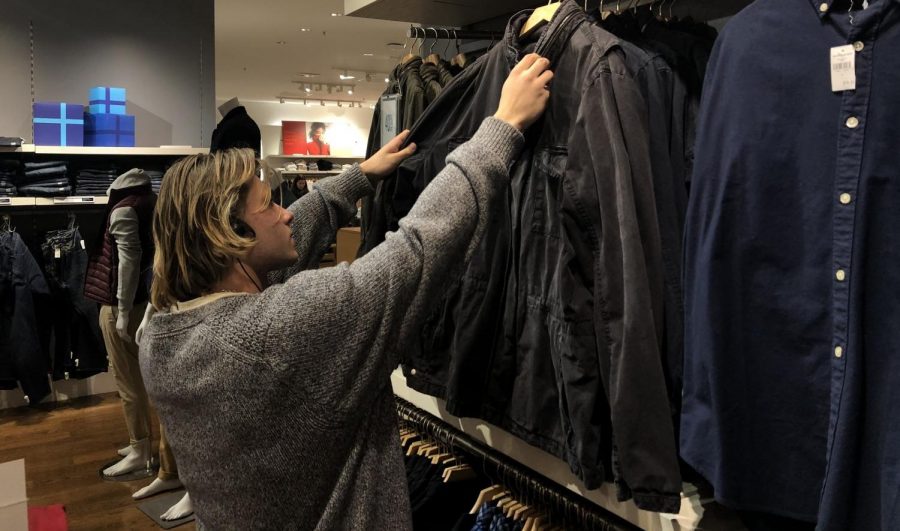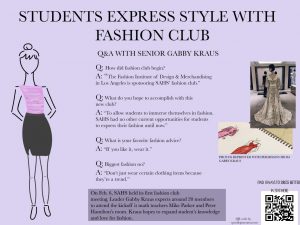Students encounter ‘copycat culture’
Junior Jack Ostrander is at the Gap. Ostrander loves expressing himself through fashion. Ostrander purposely goes against the ‘copycat culture’.
December 5, 2019
This school year Stillwater High School saw a greater number of students breaking away from the stereotypical Lululemon, Patagonia and Champion brands, choosing instead to embrace a more creative side of fashion.
These breakaway students are choosing to express themselves, while testing the societal limits of high school. Students represent what it means to survive high school, helping to tear down the ‘copycat culture’ that pollutes and intoxicates the student body.
One of the students bringing the change is junior Eliza Darby, who says “I think fashion is a way to express yourself. When I see people copying each other, it kind of makes me frustrated because I feel like you have to present yourself by what you’re wearing and if everybody’s wearing the same thing nobody can really get a read on who you are.”
The Association for Psychological Science reports that people tend to copy others around them subconsciously not purposely. Scientists say this begins in early development of the human brain. According to the APS, such mimicry is more common amongst teenagers because how easily influenced teens can be.
“A lot of people are scared to wear different clothes because then you’re going to be labeled or remembered as the kid who dresses weird,” senior Jack Ostrander said.
LA Berkley scientists report that labeling other people creates stigma due to the preconceived notions that come with such labels. Social stigma in turn influences the human brain providing an environment for teens to conform, and acting as a catalyst for ‘copycat culture’.
“Students look up to someone and emulate them wanting to be more like them, so they might think, ‘oh, if I dress like them, then maybe I will have some of those attributes that I’ve noticed as desirable,” counselor Kristina King explained.
Covetousness, the feeling or desire of having someone else’s material possessions, is a psychological term used to help describe the ‘copycat culture’.

Freshmen Maya Hanlon, Kylie Ligday, Tori Lilijgren and sophomores Brynn Savelkoul and Kendall Rogers show off their Lululemon leggings. All of their outfits resemble each other’s.
King, when asked what can be done about the negative effects of ‘copycat culture’ responded by talking about the Link Leaders program, “One area I’ve reached out to is the link leaders, and I’ve actually tapped them specifically and said hey, what lunch do you have, I have a student that’s struggling with this lunch, would you mind, and they’ve been wonderful to say, absolutely.”
However while Link Leaders are an outlet to help struggling students trying to find their place, many are concerned that the program is only a band aid which leaves the larger problem of wanting to fit in unresolved.
Forbes Magazine reports that giving a simple compliment can boost someone’s self esteem. A single compliment can help lay the foundation for students to step outside an environment created with social stigma and covetousness.
Ostrander advises any student wanting to get into fashion to “Wear whatever you want. Wear something you look cool in. Wear something you look good in, try out new and different colors, different brands and different articles of clothing.”














Alexander Corbett • Feb 6, 2020 at 8:53 am
Very good lead. The fact and quote paragraphs were very good at tying each fact together. Also the students reading this can relate to the copycat culture.
Julie Xiong • Feb 5, 2020 at 9:01 am
Great job! Your article was both inviting and informational. This particular topic is generally known within our student community, and you expressed the topic well.
Haley Nelson • Dec 18, 2019 at 10:45 pm
This article was very well written. I think that interviewing the counselor was a very good decision because that just gave a different perspective then what most students would notice. It is also interesting to just see how much this what you called ‘copy cat’ culture is relevant and distinct from day to day. Very impressed with the story though.
Joesph Devins • Dec 18, 2019 at 10:37 pm
I really enjoyed this story because of the strong diction and quotes. I think the choice to interview a counselor was refreshing and she gave an interesting perspective. I liked the strong diction when you were referring to the study. Overall a great read.
Olivia Wavamunno • Dec 18, 2019 at 5:59 pm
You did a really good job of getting different views on this topic. I think its really cool how people are starting to break away from the usual fashion trends, and are finding different ways to express themselves through their clothes. Even with new fashion and people becoming more creative, people still copy each other. I like how you brought up that the ‘copycat culture’ can be done subconsciously. Really well written article William, nice job.
Annabel • Dec 18, 2019 at 5:00 pm
The topic overall was very fun and it was nice how you wrote about style in a factual way. The end quote from Ostrander really left it off on a good note.
Elaina Mankowski • Dec 18, 2019 at 11:12 am
I thought that this article did a good job of expressing the “copy-cat” culture for not only people our age, but also the ways it’s happening in our own school. I thought you used good descriptive language and had good information included to explain why there is this phenomenon.
Elizabeth Shepperd • Dec 18, 2019 at 10:48 am
This article is very interesting to read. Definitely different than the other news articles that are written, which is great because now another group of people who are passionate about this can read it. I have definitely thought about this before and you said everything really well! Great job!
Mairin Torgerson • Dec 17, 2019 at 10:10 pm
The article was very well written with a variety of sources including students from different grades and a counselor as well. It helped me understand why students are nervous to dress differently and also included researched facts to back up the story. The paragraphs also flowed nicely and gave me a new view on ‘copycat culture.’
Charles Valerius • Dec 17, 2019 at 8:20 am
I enjoyed the different views you got for this article. This is something that so many people can relate to and see in everyday life and you captured it with the different aspects and tied them all in nicely.
Ava Hoelzel • Dec 16, 2019 at 7:00 pm
He created very descriptive sentences and descriptions. I like how he included other sources besides just the interviews. I also like how two photos were included, one from each side.
Mylana Nederloe • Dec 16, 2019 at 5:30 pm
This article is very unique compared to any other article I have read here on Pony Express. I like the angle you took on this topic of ‘copycat culture’. Not only is this article helping to spread more awareness of this issue, but it also has some very compelling facts. For example a fact that really stood out to me was how people tend to copy others around them subconsciously and not purposely.
Natalie Williams • Dec 14, 2019 at 2:58 pm
I really liked how this story related to so many students throughout our school. We can all see this ‘copy cat’ culture everyday, and I believe it is important that we all acknowledge it. I also liked how you touched on how students are starting to stray from the path of similarities. Overall, I really enjoyed reading this article.
Anastasia Bertsch • Dec 11, 2019 at 8:45 am
This article is super interesting and eye-opening. Great use of description and quotes. You did a great job of capturing what your story is all about.
Paige Sanders • Dec 9, 2019 at 7:24 pm
I like how the story captures the ‘copycat culture’ in school by providing interviews about how students feel about fashion and how students dress to express themselves. I like the picture of the girls wearing the same leggings because it emphasizes copying and similarity in school and it correlates well with the point of the story. Nice job, Will!